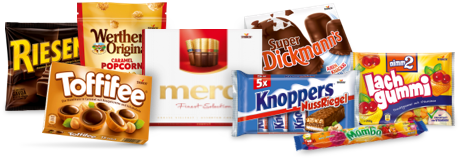Responsible cocoa procurement

© German Initiative on Sustainable Cocoa
The origins of our cocoa
Mastering all steps that influence quality in chocolate production is of crucial importance for premium chocolate specialities. That is why we produce the cocoa paste for our chocolate ourselves. It all begins with the cocoa beans that are delivered to our site in Ohrdruf, Thuringia where we clean, break and roast them. The cocoa paste for our products is made here as well.

Our cocoa beans are procured from virtually all of the world’s growing regions: we mainly process cocoa from West Africa, in particular the Ivory Coast and Ghana, as well as Ecuador in South America and the Dominican Republic in the Caribbean. Especially in the West Africa growing region, most of the cocoa does not come from larger farms but from many smaller family operations. Being organised in cooperatives and jointly marketing the cocoa beans is important for the farmers in this region.
From Central and South America, we procure fine cocoa that distinguishes our chocolate and chocolate specialities, contributing essential, special flavours. To safeguard the quality and delivery quantities of this important ingredient, we established our own fermentation and drying centre RISTOKCACAO in Ecuador with a partner in 2009. Important cocoa processing steps, including fermentation and subsequent drying, are professionally executed here. We operate our own cocoa farm in the Dominican Republic.
Storck does not have its own presence in Africa. In this region, we purchase cocoa that is certified according to the Fairtrade and Rainforest Alliance standards. In cooperation with project partners, we active support the farmers of cooperatives from which we buy cocoa. We fund projects that offer training on good agricultural practices and agroforestry and implement measures against child labour, in particular child labour monitoring and remediation systems. Our aim is to strengthen economic, ecological and social standards in the growing regions and to foster a sustainable future.

Duties of care in the cocoa supply chain
We maintain long-term business relationships with our cocoa suppliers based on mutual trust. By working with them over many years, we gain extensive insights into the activities of our business partners, thereby obtaining important information for the assessment of risks and potential improvements in the upstream supply chain.
We expect a socially responsible management system that considers and protects fundamental human rights, the rights of employees and their working conditions in the company’s business activities in accordance with the SA8000 social standard or a comparable standard. Our supplier code defines the minimum standards that Storck suppliers have to meet in their business activities and along the supply chain.
We are committed to the implementation of good agricultural practices and the responsible use of plant protection products along the supply chain. Our goal is to reduce the use of plant protection products to a minimum and to protect the environment.
Sustainable cocoa: our way
We strive to promote sustainability in cocoa farming. With this goal in mind, we have prepared a roadmap with concrete commitments as a member of the German Initiative on Sustainable Cocoa.
Engagement in partnerships
Storck has been a member of the German Initiative on Sustainable Cocoa since it was founded in 2012. All members of this multi-stakeholder initiative work together to promote sustainability in cocoa farming. Members include:
-
the German federal government, represented by the Federal Ministry for Economic Cooperation and Development (BMZ), the Federal Ministry for Food and Agriculture (BMEL),
-
companies in the German confectionery industry and the cocoa trade,
-
food retailers,
-
standard-setting organisations such as the Rainforest Alliance and Fairtrade, and other representatives of civil society.
The partners jointly pursue the goals of improving the personal circumstances of cocoa farmers and their families, conserving and protecting natural resources and biodiversity in cocoa growing countries, and increasing the production and marketing of cocoa certified according to sustainability standards.
We support various activities in African cocoa source countries through our participation in the forum and in cooperation with direct suppliers. These partnerships also allow us to implement projects in countries where we have no own presence.
Special emphasis is placed on promoting sustainable farming practices and on combating and preventing child labour. Key challenges in the complex supply chain can often be handled more effectively by the project partners on site.
One of the projects supported by us is the PRO-PLANTEURS sustainability project initiated by the German Initiative on Sustainable Cocoa and the Côte d’Ivoire government. The object of the project in Côte d’Ivoire is to improve the living conditions of cocoa farmers and their families and to increase their income. Around 30,000 family farming operations and cooperatives have been professionalised through the project to date.
Numerous training programmes help them implement sustainable farming practices, improve their nutrition through diversification measures and know-how, and drive the further development of the farmers’ cooperatives. Measures to secure a living income is one of the PRO-PLANTEURS focal points.
Additional projects
ECAMOM
In partnership with a trade partner, we support the cocoa cooperative ECAMOM in Côte d’Ivoire with effective initiatives to support women, combat child labour and increase the income of local farmers.
Kallari
The Kallari cooperative in the Amazon region focuses on environmentally friendly, biodiverse cocoa farming. We purchase cocoa beans from this agroforestry system and support the local growers’ organisation.
Virus prevention
We cooperate with numerous partners in conducting research on the early detection of the cocoa swollen shoot virus. To date, its spread can often be prevented only by clearing large areas of land.








